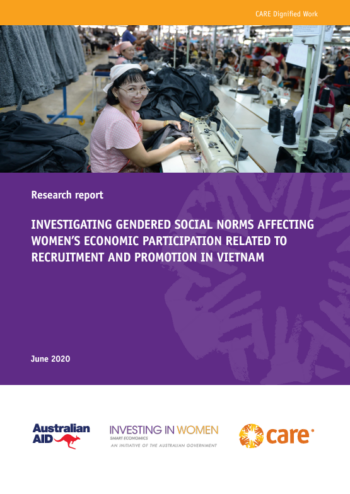2 July 2020 | Report
Investigating Gendered Social Norms Affecting Women’s Economic Participation Related to Recruitment and Promotion in Vietnam
Summary
This report explores the influence of social norms on women’s economic participation in Vietnam. It focuses on three key social norms: women’s primary responsibility for child and family caretaking, the perception that women should not be in leadership positions, and the belief that only men should be hired for technical jobs. Using CARE’s Social Norms Analysis Plot (SNAP) framework, the study involved qualitative methods, including focus group discussions and in-depth interviews with 485 participants from various sectors such as garment, food processing, banking, IT, and electricity across five locations in Vietnam. The findings highlight strong adherence to these norms, particularly the caregiving norm, which significantly influences women’s career decisions and opportunities. The report provides recommendations for addressing these norms through policy changes, workplace practices, and broader societal shifts. This research, funded by Investing in Women and conducted by CARE International,
Highlights
- Regulatory Improvement Needed: Strengthening laws on gender equality can significantly enhance women’s economic participation in Vietnam.
- Opportunity for Enhanced Company Policies: Companies can improve gender equality by implementing transparent and detailed policies that support women in leadership and technical roles.
- Comparative Advantage: Vietnam shows varied progress in WGE across different sectors, indicating significant potential for impactful changes.
- Strategic Recommendations: Integrating gender-sensitive policies and promoting workplace flexibility can advance gender equality efforts.
- Economic Benefits of WGE: Better WGE practices can lead to improved company performance and contribute positively to Vietnam’s economic growth.

Published by: Care Vietnam, Investing in Women
View other Resources
World Economic Forum Global Gender Gap 2024
The Global Gender Gap Index annually benchmarks the current state and evolution of gender parity.
Investing in Women Campaigns and Communities of Practice Brochure
This brochure summarises Investing in Women’s approach to supporting locally driven campaigns for gender equality and women’s economic empowerment.
Women’s economic empowerment strategy
The “Women’s economic empowerment strategy” articulates UN Women’s vision for enabling women’s economic agency, autonomy, and well-being.

